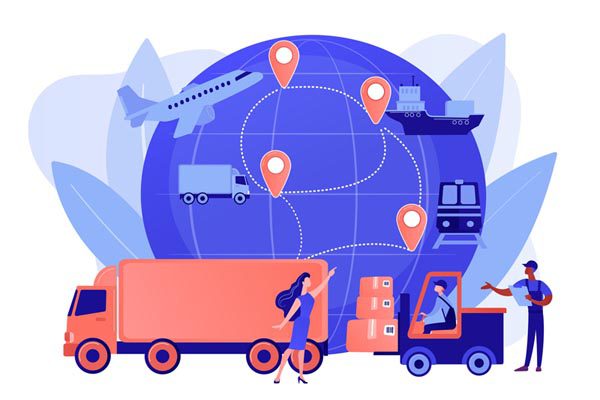Robotic Process Automation (RPA) is a popular term because it shows its worth in many fields, especially manufacturing. Want to know how robotic process automation has helped the logistics sector? RPA is making logistics work better by automating things like writing emails, making reports, doing administrative tasks, reordering products, and checking inventory. RPA helps the supply chain get a higher ROI by maximizing the specific areas.
How Did Logistics Get Started?
It was used during the Roman and Greek wars. Even back then, Rome’s logistics system was so good that it made it possible for military supplies to get to the front lines. Well, logistics is still employed by the military, but it is also used to make and send out different products and services today. There is a long chain of people and things that need to work together for anything that needs to be ordered and sent.
How Do Logistics Work?
In simple terms, logistics is getting goods and services to the right place at the right time and in the right condition. Logistics management ensures that all warehouse and transportation activities run smoothly so that deliveries are made on time and can’t be changed.
The logistics manager is in charge of everything, like keeping track of how the products move from the source to the destination. In addition, they need to find possible merchants so logistics operations can run well. We also know how hard it is to keep customers happy in the modern world.
On the plane of putting the customer first, the logistics landscape has also gotten more complicated than ever. Logistics management can only work if running the business is done well.
Details must be updated in real-time, which is very important for operations to go smoothly. Many of these things seem simple, but when you think about them, they aren’t. The main reason is that many logistics companies still rely on paperwork.
Why is Automation Necessary?
We all know how time-consuming and boring it is to do back-office tasks by hand. Also, many things can go wrong, making it likely that people will make mistakes. And any mistake can hurt the flow of logistics. So, what is the long-term answer to this kind of problem? Automation! Yes, automation can be used in logistics just like it can be used in any other field.
With the help of cutting-edge technologies like the Internet of Things (IoT), Artificial Intelligence (AI), Robotic Process Automation (RPA), as well as Machine Learning, the logistics industry can automate the tasks that used to be done by hand (ML). Out of these, RPA has shown time and time again that it can automate manual tasks well, and it might be just what the logistics industry needs.
How RPA Changes the Logistics Industry?
RPA helps logistics companies make tasks like scheduling, packing, making invoices and reports, and keeping track of shipments so they can be delivered on time easier. RPA is a virtual working population that helps with many back-office tasks. This cuts operational costs and boosts efficiency by enabling delivery on time. Let’s look at how Robotic Process Automation (RPA) has helped each task.
Creating Reports
Using RPA tools made the process of making business reports easier. It takes a lot of time when done by hand because employees have to spend many hours making daily reports. If RPA is used to make reports, a lot of time can be saved, and workers can put more attention on other important tasks. The RPA tool can get information from systems, understand it, and put together important facts for the report.
Deliveries can be ordered, scheduled, and tracked.
Keeping track of the flow of goods is a long and hard job. It includes keeping track of the details of each vendor’s PO (Purchase Order), which he or she enters into the portal at the time specified. After the data entry operators get the email, they read it, figure out what it says, and put the information into the system. Over time, these things get messy, are easy to mess up, and take a lot of time.
RPA can fix all of this mess because it can automate a lot of tasks. In this case, the RPA tool will be helpful because it can pull information about shipments from purchase orders, emails, takes notice, proofs of delivery, etc. Then it can put the information into the portal on its own. So, the whole process will be done automatically, and every stakeholder will get updates in real-time (vendor, retailer, and distributor).
Creating Invoices
If you look on the Internet, you’ll find that the average time it takes to process an invoice by hand is between 3.9 and 17.6 days! We waste so much time on things that don’t matter much. And don’t even get me started on how boring and time-consuming the follow-up process is!
RPA can help do this important but time-consuming task quickly and accurately. RPA looks through the files to see if there are any unpaid invoices, pulls out the necessary information, and then pays quickly and without help from a person. The robots send emails to the relevant employees and clients to keep track of the future.
Getting better at serving customers
Customer service can get better with the help of robots. By connecting the data warehouse systems to RPA tools, several tasks that have to do with customers can be done. It’s easy to answer customer questions quickly and help them decide what to buy.
Using robots can help a company build a good reputation, bringing in new customers, keeping the ones it already has, and increasing the ROI by making more sales. So, your workers can sigh relief because the pressure will be taken care of by robots, and they can concentrate on more pressing tasks. When there is a lot of competition in a market, RPA can help businesses do well.
Improving Email Communication
You should know by now that RPA can automate just about anything. Thus why not emails? AI and RPA can help determine what an email is about and send the right response. The tool also can keep track of changes to order emails, write emails for customers, and let them know about the changes. This way, the RPA tool can help customers feel more connected to the logistics company’s brand.



